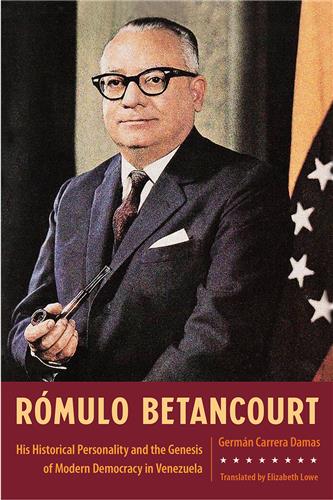Sugar Baron
Manuel Rionda and the Fortunes of Pre-Castro Cuba
Muriel McAvoy
Paper: $28.00
The story of a tycoon in the sugar industry and an in-depth view of Cuba's economy before the Revolution
Choice Outstanding Academic Title
“This excellent book recounts the fascinating career of Rionda, a Spanish immigrant to Cuba who later moved to the US and became one of the most important sugar brokers in the world. . . . A major contribution to US as well as Cuban history. . . . Highly recommended.”—Choice
“A wonderfully detailed study written with care and judiciousness. . . . An essential book for anyone working on modern Cuban history and modern business history.”—Journal of Latin American Studies
“Excellent. . . . Does a good job on a very complicated subject.”—Latin American Research Review
“A fascinating portrait of a dynamic entrepreneur whose experiences illuminate the evolving international sugar industry and the Cuban-U.S. economic relations before the Revolution.”—New West Indian Guide
“McAvoy’s detailed biography of Manuel Rionda’s domination of the Cuban sugar industry through his stewardship of the largest sugar company on the island known as the Cuban Cane Sugar Corporation fills a large void in the historical scholarship.”—Florida Historical Quarterly
“In this well-crafted, fast-paced biographical narrative, Muriel McAvoy offers an inside look into the life of one of Cuba’s great modernizing commercial and industrial pioneers.”—Business History Review
“McAvoy’s well-written book allows us to know with considerable precision the framework of business and financial relations involved in both the transformation and modernization of the Cuban sugar industry at the end of the nineteenth century and the opening of the business to financial capital in the twentieth century.”—Journal of Economic History
“A well-told narrative of people and finances. . . . Provides us with a very complex portrait of Cuba, the United States, and the world of sugar in the late nineteenth and early twentieth centuries.”—Enterprise & Society
"Sugar Baron is a brilliant, highly original narrative of the fluctuating fortunes of Cuba and its sugar industry during the republican period."—Franklin W. Knight, professor emeritus, Johns Hopkins University
"McAvoy's 'subject' is not simply Manuel Rionda as an individual, but the entire history of U.S.-Cuban relations from the Spanish-Cuban-American War to the Revolution of 1933. Believe it or not, such a story can be told from the vantage point of this one individual, and McAvoy has done it in exemplary fashion."—Cesar Ayala, University of California, Los Angeles
Sugar Baron is the story of Manuel Rionda (1854-1943), who immigrated from Spain to Cuba as a boy of 16 to become a dominant operator in the international sugar trade and to stand at the crossroads of U.S.-Cuban economic relations. Through an examination of Rionda's career as founder of the Cuba Cane Sugar Corporation and of New York's major sugar brokerage firm, Muriel McAvoy gives us an in-depth history of Cuba's sugar industry and its economy during the first half of the 20th century.
McAvoy examines the dilemmas of development and the constraints of financial dependency, probing the inside story of how both Wall Street's and Cuba's political elite viewed the crucial economic problems facing the island and how they attempted to solve them. In great detail, she elucidates conflicts among the various economic sectors in both Cuba and the United States, providing unique and often corrective insights.
Stressing the significance of the Cuban elite in furthering and profiting from the development of Cuba as a sugar enclave, Sugar Baron shows that Rionda and the other hacendados did much to ensure that a single export would dominate their island's economy, enriching themselves in the process. Challenging the view that U.S. capitalism reduced Cuba's businessmen to helpless pawns, McAvoy provides a clearer view of the responsibility for events between the Spanish-American War and the triumph of Castro's revolution.
Muriel McAvoy was professor emerita at Fitchburg State College, Massachusetts.
"There is a tremendous renewal of interest in everything Cuban these days. Florida is lucky to have such impressive research materials and, increasingly, important new books that bring history to life." - Miami Herald
--Miami Herald
" Superbly intertwines the biography of a family with the interlocking histories of both Cuba and the US. In elegant prose" ; " This is a major contribution to US as well as Cuban history".
--Choice
"A wonderfully detailed study written with care and judiciousness."
--Journal of Latin American Studies
"excellent"
--Latin American Research Review
"An inside look into the life of one of Cuba's great modernizing commerical and industrial pioneers."
"Bravo!"
--Business History Review
"McAvoy's history is a well-told narrative of people and finances . . . It also provides us with a very complex portrait of Cuba, the United States, and the world of sugar in the late nineteenth and early twentieth centuries."
--Enterprise & Society
"Outstanding book"
--New West Indian Guide
"McAvoy's excellent work provides a fascinating portrait of a dynamic entrepreneur whose experiences illuminate the evolving international sugar industry and the Cuban-U.S. economic relations before the Revolution."
--New West Indian Guide
" McAvoy challenges the view that U.S. capitalism reduced Cuba's businessmen to helpless pawns. She provides a clearer view of the responsibility for events between the Spanish-Ameican War and the triumph of Castro's revolution."
--The Forest
(Wire Story)












